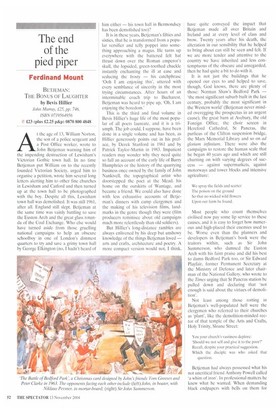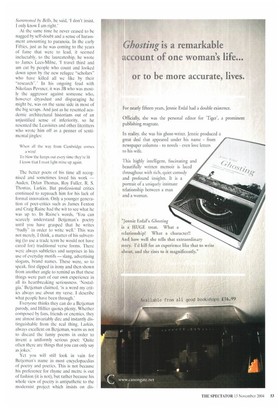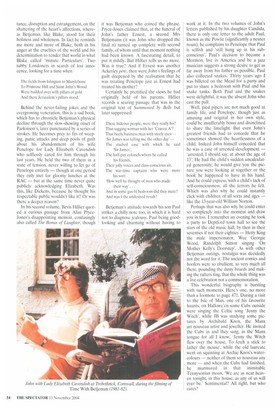The end of the pied piper
Ferdinand Mount
BETJEMAN: THE BONUS OF LAUGHTER by Bevis Hillier John Murray, £25, pp. 746, ISBN 0719564956 (C; £23 (plus £2.25 p&p) 0870 800 4848 At the age of 13, William Norton, the son of a police sergeant and a Post Office worker, wrote to John Betjeman warning him of the impending destruction of Lewisham's Victorian Gothic town hall. In no time Betjeman put William on to the recently founded Victorian Society, urged him to organise a petition, wrote him several long letters alerting him to other fine churches in Lewisham and Catford and then turned up at the town hall to be photographed with the boy. Despite all this, Lewisham town hall was demolished. It was still 1961, after all. England still slept. Betjeman at the same time was vainly battling to save the Euston Arch and the great glass rotunda of the Coal Exchange. Who else would have turned aside from those gruelling national campaigns to help an obscure schoolboy in one of London's dimmest quarters to try and save a grimy town hall by George Elkington (no, I hadn't heard of
him either — his town hall in Bermondsey has been demolished too)?
It is in these years, Betjeman's fifties and sixties, that he is transformed from a popular versifier and telly poppet into something approaching a magus. He turns up everywhere with the battered felt hat thrust down over the Roman emperor's skull, the lopsided, green-toothed chuckle instantly enchanting the ill at ease and seducing the frosty — his catchphrase 'Ooh I am enjoying this', uttered with every semblance of sincerity in the most trying circumstances. After hours of an interminable coach trip to Bucharest, Betjeman was heard to pipe up, 'Oh, I am enjoying the boredom.'
This is the third and final volume in Bevis Hillier's huge life of the most popular of all poets laureate, and it is a triumph. The job could, I suppose, have been done in a single volume and has been, as Hillier generously points out in his preface, by Derek Stanford in 1961 and by Patrick Taylor-Martin in 1983. Impatient readers may wonder why they need quite so full an account of the early life of Barry Humphries or the history of the quarrying business once owned by the family of John Nankivell, the topographical artist who doorstepped the poet at the Mead, his home on the outskirts of Wantage, and became a friend. We could also have done with less exhaustive accounts of Betjeman's dinners with camp clergymen and the making of his television films, landmarks in the genre though they were (film producers reminisce about old campaigns much more relentlessly than old soldiers).
But Hillier's long-distance rambles are always enlivened by his deep but unshowy knowledge of the things Betjeman loved — arts and crafts, architecture and poetry. A more compact version would not, I think, have quite conveyed the impact that Betjeman made all over Britain and Ireland and at every level of class and brow. Twenty years after his death, the alteration in our sensibility that he helped to bring about can still be seen and felt. If we are more tender and attentive to the country we have inherited and less contemptuous of the obscure and unregarded, then he had quite a hit to do with it.
It is not just the buildings that he opened our eyes to and helped to save, though, God knows, there are plenty of those: Norman Shaw's Bedford Park — 'the most significant suburb built in the last century, probably the most significant in the Western world' (Betjeman never minded overegging the prospectus in an urgent cause), the great barn at Avebury, the old Foreign Office, the choir screen in Hereford Cathedral, St Pancras, the purlieus of the Clifton suspension bridge, the Marx Memorial Library and so on ad gloriam infinitam. There were also the campaigns to restore the human scale that he began 40 years ago and which are stilt churning on with varying degrees of success — against supermarkets, against motorways and tower blocks and intensive agriculture: We spray the Fields and scatter The poison on the ground
So that no wicked wild flowers Upon our farm be found.
Most people who count themselves civilised now pay some lip service to these causes, and it is easy to forget how numerous and high-placed their enemies used to be. Worse even than the planners and developers in Betjeman's book were the traitors within, such as Sir John Summerson, who damned the Euston Arch with his faint praise and did his best to damn Bedford Park too, or Sir Edward Playfair, former Permanent Secretary at the Ministry of Defence and later chairman of the National Gallery, who wrote to the Times urging that St Pancras station be pulled down and declaring that 'not enough is said about the virtues of demolition'.
Not least among those rotting in Betjeman's well-populated hell were the clergymen who referred to their churches as 'plant', like the demolition-minded rector of that temple of the Arts and Crafts, Holy Trinity, Sloane Street: You your church's vastiness deplore: 'Should we not sell and give it to the poor?' Recall, despite your practical suggestion, Which the disciple was who asked that question.
Betjeman had always possessed what his not uncritical friend Anthony Powell called 'a whim of iron'. In professional matters he knew what he wanted. When demanding black endpapers with bells on them for
Summoned by Bells, he said, 'I don't insist. I only know I am right.'
At the same time he never ceased to be nagged by self-doubt and a sense of harassment amounting to paranoia. In the early Fifties, just as he was coming to the years of fame that were to lead, it seemed ineluctably, to the laureateship, he wrote to James Lees-Milne, 'I travel third and am cut by people who count and looked down upon by the new refugee "scholars" who have killed all we like by their "research".' In his ongoing feud with Nikolaus Pevsner, it was JB who was mostly the aggressor against someone who, however dryasdust and disparaging he might be, was on the same side in most of the big scraps. And just as he resented academic architectural historians out of an unjustified sense of inferiority, so he resented the Leavisites and other litcritters who wrote him off as a penner of sentimental jingles:
When all the way from Cambridge comes a wind To blow the lamps out every time they're lit I know that I must light mine up again.
The better poets of his time all recognised and sometimes loved his work — Auden, Dylan Thomas, Roy Fuller, R. S. Thomas, Larkin. But professional critics continued to reproach him for his lack of formal innovation. Only a younger generation of poet-critics such as James Fenton and Craig Raine had the wit to see what he was up to. In Raine's words, 'You can scarcely understand Betjeman's poetry until you have grasped that he writes "badly" in order to write well.' This was not merely, I think, a matter of his subverting (to use a trade term he would not have cared for) traditional verse forms, There were always subtleties and surprises in his use of everyday motifs — slang, advertising slogans, brand names. These were, so to speak, first dipped in irony and then shown from another angle to remind us that these things were part of our own experience in all its heartbreaking seriousness, 'Nostalgia,' Betjeman claimed, 'is a word my critics always use about my verse. I describe what people have been through.'
Everyone thinks they can do a Betjeman parody, and Hillier quotes plenty. Whether composed by fans, friends or enemies, they are almost invariably dire and instantly distinguishable from the real thing. Larkin, always excellent on Betjeman, warns us not to discard the funny poems in order to invent a uniformly serious poet: 'Quite often there arc things that you can only say as jokes.'
Yet you will still look in vain for Betjeman's name in most encyclopaedias of poetry and poetics. This is not because his preference for rhyme and metre is out of fashion (it is not), but rather because his whole view of poetry is antipathetic to the modernist project which insists on dis tance, disruption and estrangement, on the shattering of the heart's affections, whereas Betjeman, like Blake, stood for their holiness and wholeness. In fact he reminds me more and more of Blake, both in his anger at the cruelties of the world and his determination to render that world in what Blake called 'minute Particulars'. Two tubby Londoners in search of lost innocence, looking for a time when
The fields from Islington to Marylebone To Primrose Hill and Saint John's Wood Were builded over with pillars of gold And there Jerusalem's pillars stood.
Behind the never-failing jokes and the eve rgrowing veneration, this is a sad book, which has to chronicle Betjeman's physical decline through the slow-showing onset of Parkinson's, later punctuated by a series of strokes. He becomes prey to fits of weeping, panic attacks and deep pools of guilt about his abandonment of his wife Penelope for Lady Elizabeth Cavendish who selflessly cared for him through his last years. He held the two of them in a state of tension, never willing to let go of Penelope entirely — though at one period they only met for gloomy lunches at the RAC — but at the same time never quite publicly acknowledging Elizabeth. Was this, like Dickens, because he thought his respectable public wouldn't like it? Or was there a deeper reason?
In his second volume, Bevis Hillier quoted a curious passage from Alan PryceJones's disappointing memoir, confusingly also called The Bonus of Laughter, though
it was Betjennan who coined the phrase. Pryce-Jones claimed that, at the funeral of John's father Ernest, a second Mrs Betjemann (it was John who dropped the final n) turned up complete with second family, of whom until that moment nothing had been known. A fascinating detail, to put it mildly. But Hillier tells us no more. Was it true? And if Ernest was another Ackerley pere, then were John's feelings of guilt deepened by the realisation that he was treating Penelope just as Ernest had treated his mother?
Certainly he prettified the views he had originally held of his parents. Hillier records a searing passage that was in the original text of Summoned by Bells but later suppressed:
These hideous people, were they really his? That sagging woman with her 'Craven A'? That beefy business man with steely eyes — 'Sir James was telling me the other day' — The studied ease with which he said 'Sir James', The half-pay colonels whom he called his friends, Their jolly voices and class-conscious air, The war-time captains who were more his sort: 'How well he thought of men who made their way' ...
And in some gas-lit bedroom did they mate'? And was I the undesired result?
Betjeman's attitude towards his son Paul strikes a chilly note too, in which it is hard not to diagnose jealousy, Paul being goodlooking and charming without having to
work at it. In the two volumes of John's letters published by his daughter Candida, there is only one letter to the adult Paul, known as the Powlie (significantly a neuter noun); he complains to Penelope that Paul is selfish and 'still hung up in his subconscious'. Paul's decision to become a Mormon, live in America and be a jaz7 musician suggests a strong desire to get as far away from his father as possible. Paul also collected snakes. Thirty years ago I was billeted on the Mead for a party and put to share a bedroom with Paul and his snake tanks. Both Paul and the snakes were delightful, it was the absent John who cast the pall.
Well, pied pipers are not much good at family life, and Penelope, though just as amusing and original in her own style, could be insufferably bossy and disinclined to share the limelight. But even John's greatest friends had to concede that he sometimes showed the heartlessness of a child. Indeed John himself conceded that he was a case of arrested development — 'arrested, I should say, at about the age of 13'. He had the child's sudden uncalculated generosity; he would give you the picture you were looking at together or the book he happened to have in his hand. And he could express, with a child's lack of self-consciousness, all the terrors he felt. Which was also why he could instantly click with children of all sorts and ages — like the 13-year-old William Norton.
Perhaps that was also why he could enter so completely into the moment and draw you in too. I remember an evening he took a party to Deptford town hall to see the stars of the old music hall, by then in their seventies if not their eighties — Hetty King the male impersonator, Wee Georgie Wood, Randolph Sutton singing 'On Mother Kelly's Doorstep'. As with other Betjernan outings, nostalgia was decidedly not the word for it. The ancient comics and hoofers were so ebullient, so very much all there, pounding the dusty boards and making the rafters ring, that the whole thing was a live celebration not a commemoration.
This wonderful biography is bursting with such moments. Here's one, no more than a footnote to page 471. During a visit to the Isle of Man, one of his favourite haunts, on Hallowe'en some Cubs outside were singing the Celtic song 'Jenny the Witch', while 1B was studying some pictures by Archibald Knox, the Manx art nouveau artist and jeweller. He invited the Cubs in and they sang, in the Manx tongue for all I know, 'Jenny the Witch flew over the house, To fetch a stick to lather the mouse', while the old laureate went on squinting at Archie Knox's watercolours — neither of them so nouveau any more — and when the Cubs had finished, he murmured in that inimitable Tennysonian moan, 'We are as near heaven tonight, in this house, as any of us will ever be.' Sentimental? All right, but who cares?




























































































 Previous page
Previous page